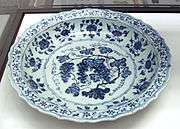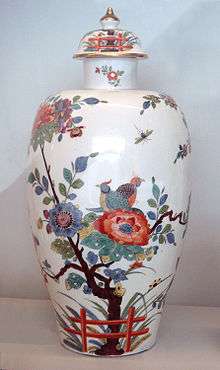Rouen manufactory
| French porcelain |
|---|
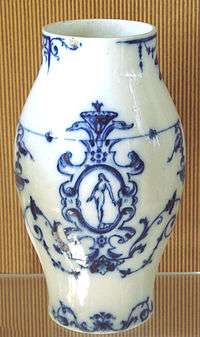 Rouen soft-paste porcelain vase, |
The Rouen manufactory (1673-96) was an early French manufactory for faience and soft-paste porcelain, located in Rouen, Normandy.
Soft-paste porcelain (1673–96)

The first soft-paste porcelain of France, and specifically frit porcelain, was produced at Rouen in 1673, in order to mimic "la véritable porcelaine de Chine" ("The true porcelain of China").[1][2] The new soft-paste porcelain material was invented by the potter Louis Poterat.[1] The soft porcelain used blue designs of the type already used in the faiences of the period.[1]
The porcelain at Rouen became known as "Porcelaine française".[1] These were developed in an effort to imitate high-valued Chinese hard-paste porcelain.[1] These events followed the creation of the French East India Company in 1664, and the influx of Chinese wares it generated.
The Rouen paste was very light, lighter than any other French make except Sèvres porcelain, and clearly less amber than Saint-Cloud porcelain.[1]
The Rouen porcelain manufactory closed in 1696.[3] Contrary to the Saint-Cloud manufactory, Rouen porcelain was only produced on a small scale, and failed to be commercially viable.[4] It was characterized by an intense blue glaze, and minimalist blue decorations which only occupied a small portion of the available space in any given object.[4]
 Rouen soft-paste porcelain cup with lid, end of the 17th century.
Rouen soft-paste porcelain cup with lid, end of the 17th century. Rouen soft-paste porcelain bottle, end of the 17th century.
Rouen soft-paste porcelain bottle, end of the 17th century. Rouen soft-paste porcelain bottle, end of the 17th century.
Rouen soft-paste porcelain bottle, end of the 17th century. Rouen porcelain bottle, end of the 17th century.
Rouen porcelain bottle, end of the 17th century.
Rouen faience
After the end of porcelain production, various faience products continued to be produced, however.
Rouen ceramics were copied extensively, by manufactories such as the Sinceny manufactory, founded in 1713, when potters from Rouen moved there to establish their own venture, or by Saint-Cloud manufactory.[5]

 Sugar powder holder, Rouen faience with great fired blue designs, c. 1700.
Sugar powder holder, Rouen faience with great fired blue designs, c. 1700.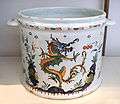 Rouen polychrome faience seau with Chinese dragon, 1725–40.
Rouen polychrome faience seau with Chinese dragon, 1725–40.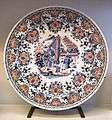 Rouen polychrome faience plate with Chinese scene, c. 1730.
Rouen polychrome faience plate with Chinese scene, c. 1730.
References
- 1 2 3 4 5 6 Artificial Soft Paste Porcelain - France, Italy, Spain and England Edwin Atlee Barber p.5-6
- ↑ Porcelain Edward Dillon p.239
- ↑ Antiques a to Z - a Pocket Handbook for Collectors and Dealers Edward Wenham p.105
- 1 2 Metropolitan Museum of Art
- ↑ Historic Ornament - Treatise on Decorative Art and Architectural Ornament by James Ward p.64
